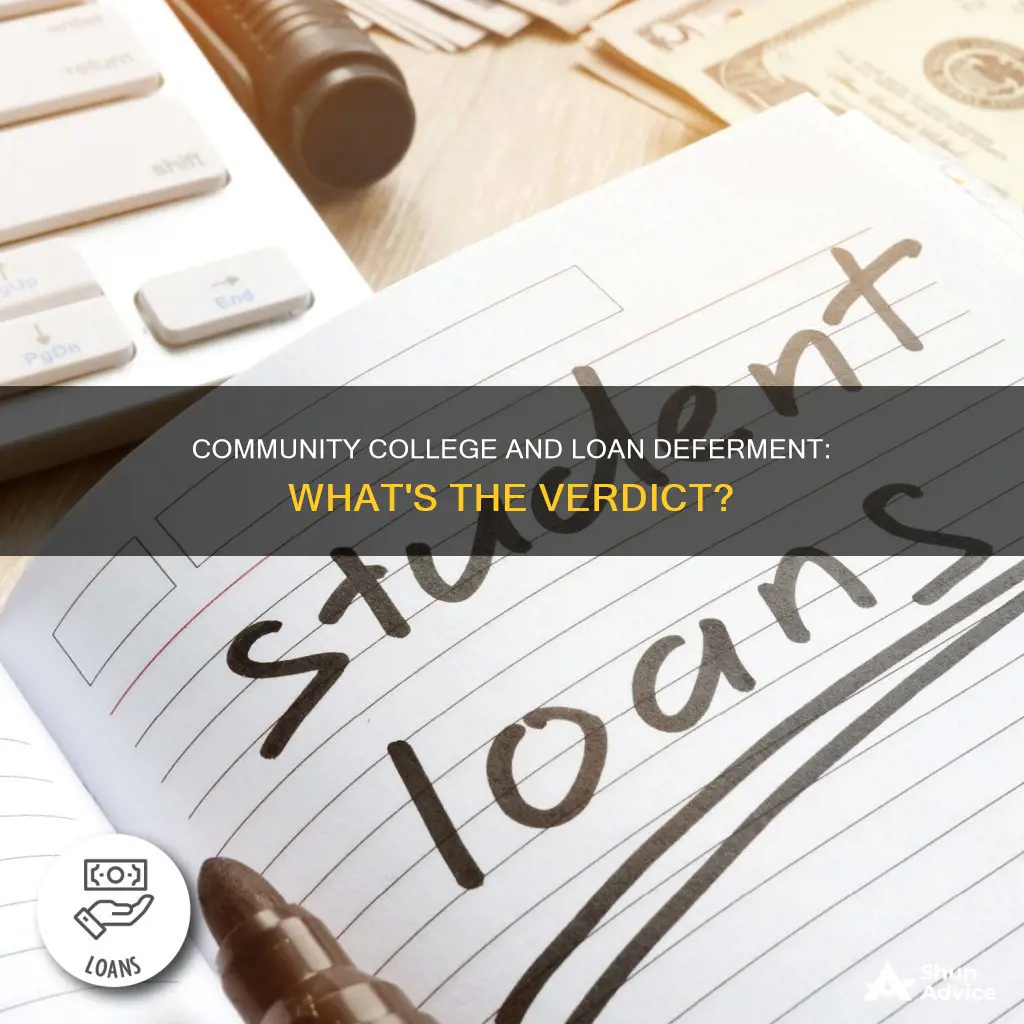
Enrolling in community college can be a great way to defer your student loan payments. Many community colleges offer in-school deferment programs that allow students to temporarily stop payments on their prior loans. To qualify for an in-school deferment, students typically need to be enrolled in a minimum number of credit hours each semester, which is usually around 6 credit hours. This option is particularly attractive to those who want to avoid high student loan interest accruals. However, it's important to note that community college tuition, books, parking, and other incidental expenses will still need to be covered, and these costs should be considered when making a decision.
| Characteristics | Values |
|---|---|
| Who can apply for loan deferment? | Students and graduates |
| Reasons for loan deferment | Currently in school, financial difficulty after graduation, attending graduate school, internships, fellowships, residencies, volunteering for the Peace Corps, active duty in the military |
| Enrollment criteria | Enrolled in at least 6 credit hours each semester |
| Documentation | School enrollment information, fellowship acceptance letters, active-duty paperwork, evidence of unemployment |
| Cost | Tuition fees, books, parking, and incidentals |
| Interest | Interest may accrue during the deferment period |
What You'll Learn

Enrolled in at least 6 credit hours each semester
Enrolling in at least 6 credit hours each semester at a community college can be a valid reason for loan deferment. This is because many lenders consider students enrolled in at least 6 credit hours to be eligible for an in-school deferment, which allows them to temporarily stop payments on their existing loans.
To ensure that you are eligible for an in-school deferment, it is important to confirm that your community college reports your enrollment status to the National Student Clearinghouse (NSC). Most student loan lenders and servicers use the NSC to determine eligibility for deferment. If your college does not automatically report this information, you may need to submit a request form to the relevant office, such as the Admission and Registration Office, to receive an enrollment verification letter.
It is worth noting that you may still be responsible for any loan payments that are due before your in-school deferment is processed. Additionally, you may be liable for the interest that accrues during the deferment period. Therefore, it is advisable to contact your loan servicer(s) and inform them of your enrollment status and credit hours to understand their specific requirements for deferment.
While community college can be a strategy to manage loan payments, it is important to consider the overall cost of attendance. Even with a deferred loan, you may still need to pay for books, parking, and other incidental expenses out of pocket. Furthermore, the time spent in community college may not count toward any loan forgiveness programs based on the number of years of repayment. Thus, it is essential to carefully evaluate your financial situation and consider seeking advice from a financial advisor or student loan specialist before making a decision.
Citrus Loans: Available in Florida?
You may want to see also

Interest accrual during the deferment period
Enrolling in community college can be a way to defer your student loan payments, but it's important to understand how interest accrues during this time. During a loan deferment period, interest will continue to accrue, and the only exception to this is if you have subsidized loans, Perkins loans, or the subsidized portion of Direct or FFEL consolidation loans. These specific loan types do not accrue interest during deferment.
If you have unsubsidized loans, interest will accrue during the deferment period. This means that while your loan payments are temporarily paused, the interest costs will keep adding up. This interest may then be added to your principal balance when the deferment period ends, and you resume making payments. This process is known as capitalization.
For example, let's say you owe $35,000 in student loans with a 5.70% interest rate, and you enter a one-year deferment period without making any interest payments. By the end of the year, approximately $1,995 in interest would have accrued, bringing your new loan balance to $36,995. From then on, you would be paying interest on this higher loan balance.
While deferment provides temporary financial relief, the interest costs can add up quickly. One strategy to manage this is to continue making interest-only payments during the deferment period. This option can prevent your total loan balance from increasing significantly when the deferment ends. However, this may not be feasible for everyone, as it requires having the financial means to cover these payments.
Another strategy is to consider refinancing your loans to reduce your interest rate once you start repaying them. This approach can help you save money on your loans over their lifetime. However, refinancing may not be suitable for everyone, as private loans typically do not offer deferment or forbearance options, and you could be in financial trouble if you encounter repayment issues in the future.
Chase Small Loans: What You Need to Know
You may want to see also

Loan deferment for Peace Corps volunteers
If you are a Peace Corps volunteer, your loan deferment options depend on the type of loan you have and your lender's policies. Contact your lender as soon as you accept your Peace Corps invitation to discuss your options. While serving, you are still responsible for any student loans you have, but there may be benefits available, including deferment, partial cancellation, income-driven repayment, or forgiveness.
If you have federal student loans, such as Stafford, Perkins, Direct, or Consolidated loans, you may be eligible for deferment during your Peace Corps service. Volunteers with Perkins loans may be eligible for a 15–70% cancellation benefit. Peace Corps service is also considered qualifying employment for the Department of Education's Public Service Loan Forgiveness (PSLF) Program. If you are working full-time for a qualifying employer, PSLF forgives the remainder of certain federal loans after 120 monthly payments are made under a qualifying repayment plan.
If you have private loans, you will need to contact your loan servicer to see if they provide any student loan relief for Peace Corps Volunteer service. Private student loans may offer deferment or forbearance under certain circumstances, but you are generally responsible for the interest accrued during this period.
It is important to carefully research your options, as your individual circumstances will determine the best choice for you. Additionally, keep in mind that you may need to reapply for loan deferment after a certain period, as some lenders require a new application annually.
Cibil Scores: Education Loan Obstacles and Opportunities
You may want to see also

Loan deferment for military personnel
There are several forms of student loan relief available for military personnel. If you are an active-duty member of the military, you may be eligible for certain protections and benefits related to your student loans. These include:
- Lowering the interest rate on all student loans taken out prior to your military service to 6%.
- If you plan to work in the military for 10 years and have federal loans, you likely qualify for an income-driven repayment plan and loan forgiveness through the Public Service Loan Forgiveness (PSLF) program.
- Interest accrual limits: Interest will not accrue on any Direct Loans issued after October 1, 2008, for military members serving in a hostile area that qualifies for special pay.
- Grace periods: Initial grace periods can be extended for up to three years if you are called to active duty for longer than 30 days before your grace period ends. Your grace period will restart when you return from active duty.
- Deferments: Special deferments are available to military members on deployments and some other circumstances to pause student loan payments while in repayment or in school.
- Forbearances: Service members and their families can also take advantage of forbearances in some circumstances.
Additionally, some states have programs to help active-duty military members take a leave of absence from school without penalties. These states may also require schools to provide refunds or tuition credits to service members called to duty.
Cheque Centre Loans: What You Need to Know
You may want to see also

Loan deferment for unemployed individuals
Dealing with student loans when unemployed can be stressful, but there are options to help manage your debt. If you are unemployed, you may be eligible for a deferment or forbearance of your loans.
Federal Loans
Federal student loans offer deferment for unemployed individuals. You can postpone the repayment of federal student loans for up to 36 months. To qualify, you must be receiving unemployment benefits or working part-time while seeking full-time work. You will need to submit an unemployment deferment application to your student loan servicer and provide documentation showing that you are eligible for unemployment benefits. During the deferment, interest will accrue on your loans, increasing the total amount you will repay.
Private Loans
Private lenders may also allow you to postpone payments if you are unemployed or facing financial hardship. Contact your private loan lender to discuss your options and let them know that your financial situation has changed. You may be able to request interest-only loan payments or apply for forbearance.
In-School Deferment
Enrolling in community college classes can be a strategy to qualify for an in-school deferment. To be eligible, you typically need to be enrolled in a minimum number of credit hours each semester. This strategy may be most effective if considered before completing your bachelor's degree. By enrolling in community college classes, you can temporarily postpone your student loan payments and take advantage of the lower tuition costs compared to a four-year institution.
It is important to carefully consider your options and seek additional information from official sources to make an informed decision regarding loan deferment.
Chase Bank: Physician Loan Options and Opportunities
You may want to see also
Frequently asked questions
Student loan deferment is a temporary period of time when you don't need to make student loan payments. This is usually because you are currently in school or are finding it financially difficult to make payments after graduation.
Yes, community college can be a great way to defer your student loans. However, you will need to be enrolled in at least 6 credit hours each semester to be eligible for an in-school deferment.
To apply for loan deferment, you will need to contact your student loan servicers and provide the necessary documentation to prove that you qualify. This could include school enrollment information, fellowship acceptance letters, or active-duty paperwork.
Yes, many lenders provide deferment for those who volunteer for the Peace Corps or are active-duty military personnel. You may also qualify for deferment if you are unemployed or have recently experienced job loss.







